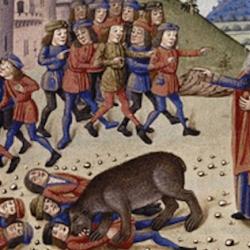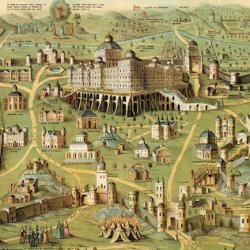In the account of Josiah’s reform in 2 Kings 23, there is frequent reference to “defiling” (vv 4, 6, 8, 10, 13, 14, 16, 20). Josiah defiles by scattering the ashes from a destroyed Asherah pole, by filling holy places with bones, by burning bones on altars. It’s not enough just to destroy the shrines and vessels of idolatrous worship. That would interrupt the worship, but it doesn’t remove the holiness and sanctity of the place or the things.
Sanctity or holiness is a condition, a status, and that can be reversed only by some act that transfers the sacred to the profane. Sacredness has to do with cleanness, but also with life. Bones, ashes, and death defile, and so to bring a definitive end to these shrines and altars Josiah not only has to destroy but to defile. Jeroboam’s altar was split in two; but because it wasn’t defiled, Jeroboam just rebuilt it and carried on. Josiah makes that impossible.
We are not operating in the same world of clean and unclean, holy and common, as Josiah did in the OT, but the principle of pollution as a strategy of spiritual warfare still applies. Basically, Josiah turns something considered holy and desirable into an object of contempt and disgust. This is what pro-life activists do when they challenge the rhetoric of “it’s the mother’s right to choose” but showing pictures of aborted babies and videos of abortion procedures – it turns what seems like an All-American right to choose into disgust. The same thing with sodomy: By telling the truth about the lifestyles of gay men, we make the gay lifestyle seem disgusting, which it is. Truthful exposure of deeds of darkness is a strategy of defilement.
The writer of Kings himself carries this out by defiling names. As Ian Provan points out, the name of “Topheth” uses the vowels from the word for “shame.” This is not its original spelling, but the writer of Kings gives it a defiled name, a name expressing his disgust. He changes the spelling of the “Mount of Olives” as well – from har hammisha to har hammashit – and in so doing, changes the name from “Mount of Olives” to “Mount of Destruction” or “Mount of Corruption” (v 13).
Here is a key element of spiritual/cultural war: Identify the idols that the enemies of Christ revere as holy, and pollute them.














